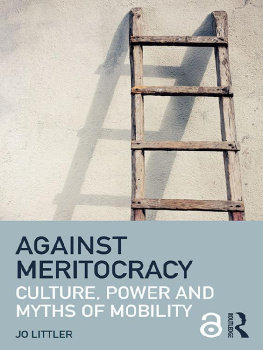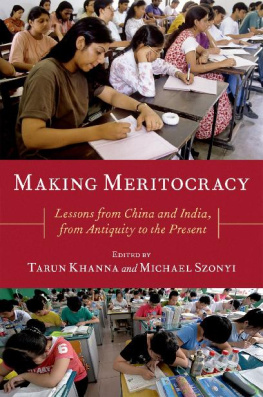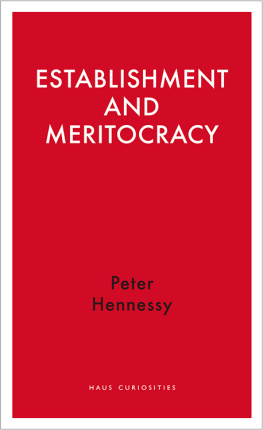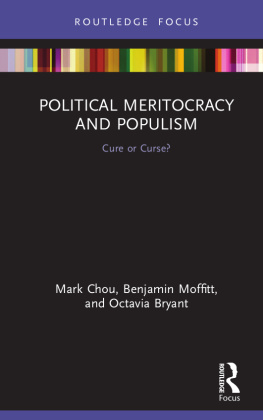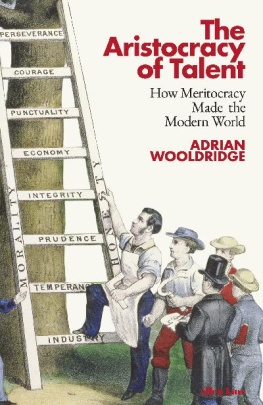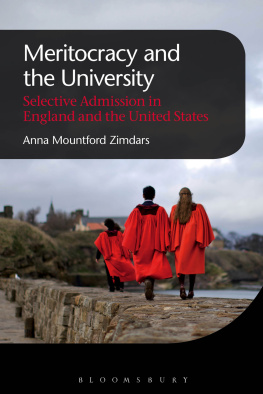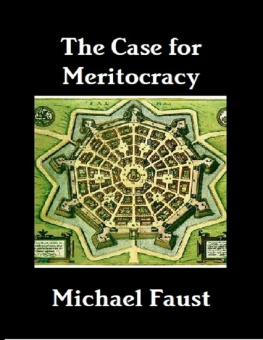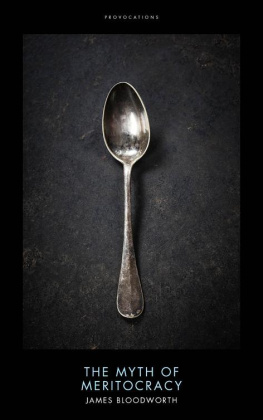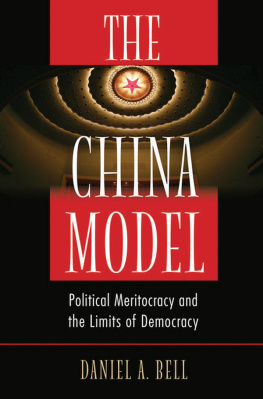Jo Littler - Against Meritocracy
Here you can read online Jo Littler - Against Meritocracy full text of the book (entire story) in english for free. Download pdf and epub, get meaning, cover and reviews about this ebook. year: 2017, publisher: Taylor and Francis, genre: Politics. Description of the work, (preface) as well as reviews are available. Best literature library LitArk.com created for fans of good reading and offers a wide selection of genres:
Romance novel
Science fiction
Adventure
Detective
Science
History
Home and family
Prose
Art
Politics
Computer
Non-fiction
Religion
Business
Children
Humor
Choose a favorite category and find really read worthwhile books. Enjoy immersion in the world of imagination, feel the emotions of the characters or learn something new for yourself, make an fascinating discovery.
- Book:Against Meritocracy
- Author:
- Publisher:Taylor and Francis
- Genre:
- Year:2017
- Rating:3 / 5
- Favourites:Add to favourites
- Your mark:
- 60
- 1
- 2
- 3
- 4
- 5
Against Meritocracy: summary, description and annotation
We offer to read an annotation, description, summary or preface (depends on what the author of the book "Against Meritocracy" wrote himself). If you haven't found the necessary information about the book — write in the comments, we will try to find it.
Against Meritocracy — read online for free the complete book (whole text) full work
Below is the text of the book, divided by pages. System saving the place of the last page read, allows you to conveniently read the book "Against Meritocracy" online for free, without having to search again every time where you left off. Put a bookmark, and you can go to the page where you finished reading at any time.
Font size:
Interval:
Bookmark:
Meritocracy today involves the idea that whatever your social position at birth, society ought to offer enough opportunity and mobility for talent to combine with effort in order to rise to the top. This idea is one of the most prevalent social and cultural tropes of our time, as palpable in the speeches of politicians as in popular culture. In this book Jo Littler argues that meritocracy is the key cultural means of legitimation for contemporary neoliberal culture and that whilst it promises opportunity, it in fact creates new forms of social division.
Against Meritocracy is split into two parts. Part I explores the genealogies of meritocracy within social theory, political discourse and working cultures. It traces the dramatic U-turn in meritocracys meaning, from socialist slur to a contemporary ideal of how a society should be organised. Part II uses a series of case studies to analyse the cultural pull of popular parables of progress, from reality TV to the super-rich and celebrity CEOs, from social media controversies to the rise of the mumpreneur. Paying special attention to the role of gender, race and class, this book provides new conceptualisations of the meaning of meritocracy in contemporary culture and society.
Jo Littler is a Reader in the Centre for Culture and Creative Industries in the Department of Sociology at City, University of London. She is the author of Radical Consumption: Shopping for change in contemporary culture (2009) and co-editor, with Roshi Naidoo, of The Politics of Heritage: The Legacies of Race (2005).
AGAINST MERITOCRACY
Culture, power and myths of mobility
Jo Littler

First published 2018
by Routledge
2 Park Square, Milton Park, Abingdon, Oxon, OX14 4RN
and by Routledge
711 Third Avenue, New York, NY 10017
Routledge is an imprint of the Taylor & Francis Group, an informa business
2018 Jo Littler
The right of Jo Littler to be identified as author of this work has been asserted by her in accordance with sections 77 and 78 of the Copyright, Designs and Patents Act 1988.
The Open Access version of this book, available at www.taylorfrancis.com, has been made available under a Creative Commons Attribution-Non Commercial-No Derivatives 4.0 license.
Trademark notice: Product or corporate names may be trademarks or registered trademarks, and are used only for identification and explanation without intent to infringe.
British Library Cataloguing-in-Publication Data
A catalogue record for this book is available from the British Library
Library of Congress Cataloging-in-Publication Data
Names: Littler, Jo, 1972- author.
Title: Against meritocracy : culture, power and myths of mobility / Jo Littler.
Description: Abingdon, Oxon ; NewYork, NY : Routledge, 2017. | Includes index.
Identifiers: LCCN 2017002013 | ISBN 9781138889545 (hardback : alk. paper) | ISBN 9781138889552 (pbk. : alk. paper) | ISBN 9781315712802 (ebook)
Subjects: LCSH: Social mobility. | Plutocracy. | Power (Social sciences)
Classification: LCC HT612 .L57 2017 | DDC 305.5/13--dc23
LC record available at https://lccn.loc.gov/2017002013
ISBN: 978-1-138-88954-5 (hbk)
ISBN: 978-1-138-88955-2 (pbk)
ISBN: 978-1-315-71280-2 (ebk)
For Jeremy,
For Robin and Isla,
And for everyone who reads it
I have always loved acknowledgements in academic books. As an undergraduate they were evidence that these authors were indeed living, breathing, feeling people with lives. They offered slivers of insight into what the existence of this strange breed called academics might actually be like. Plus! they seemed to be one of the few ways to find out something of how these books actually got written. My all-time favourite academic preface is in Alan Sinfields book Faultlines (Oxford: Clarendon Press, 1992), where he dissects this miniature paratextual genre with arch wisdom (we might, he writes, call it the higher gossip). Noting that, at least these days, fewer prefaces end with the ultimate solecism: thanking the wife for typing it all, Sinfield thanks his male partner and concludes with a flourish: Oh, and I typed it myself.
I cannot match Alan Sinfields sardonic prowess and only occasionally stray into the confessional. However, I share the sense that it is useful to expose a little of the process involved in writing, in order to dramatise the palpable fact that books are not the singular product of the name on the spine but the result of multiple apparatuses and flows of communication (although I also typed it myself). There are many thanks to give indeed, given the nature of interdependent relationality, infinite thanks but Ill try and keep it brief.
First and foremost I want to thank my partner Jeremy Gilbert, not just for my extensive exploitation of our mutual editing service but for his love and support and for making everyday life more meaningful than I could otherwise imagine. Thanks and lots of love to our daughters Robin and Isla: yes, I have finished my work now. At least for the moment. Many thanks to all of my extended family and friends, from Aachen to Swansea, from Lucky Cloud to the locals, who I look forward to seeing more of now the intense stage of completing the book is over.
This book would not have been finished nor indeed properly started, as at least half of it was written at this time without a three-month research sabbatical from City, University of London where I have worked for the last few years. It was my first sabbatical for ten years, and it is not a coincidence that is also my first single-authored book in ten years. I would like to thank all my colleagues in Sociology (especially Rachel Cohen, who pointed me in the direction of some useful statistics) and in particular my colleagues in the Centre for Culture and Creative Industries: Debbie Dickinson, Cecilia Dinardi, Ana Gaio, Ros Gill, Jenny Mbaye, Janet Merkel, Andy Pratt, Marisol Sandoval, Alex Williams and Diana Yeh.
A small proportion of this work appeared in earlier versions in previous publications. Meritocracy as Plutocracy: The Marketising of Equality within Neoliberalism (New Formations 8081 [2013] pp. 5272) appears in chapters 1 and 2. I am grateful to Lawrence & Wishart for permission to use this piece. A couple of small (and adapted) paragraphs from Consumer Culture and Cultural Studies (in Deirdre Shaw, Michal Carrington and Andreas Chatzidakis [eds], Ethics and Morality in Consumer Culture: Interdisciplinary Perspectives [New York: Routledge, 2016]) and from The New Victorians: Celebrity Charity and the Demise of the Welfare State (Celebrity Studies 6[4] [2015] pp. 471485) appear in chapters 2 and 4. A few paragraphs in is the result of many conversations with Roshi Naidoo on the matter, and part of a paper we are writing, and I am grateful to Roshi for her laser-like sense of humour and for being a wonderful friend.
I am also grateful for the wit and wisdom of friends, colleagues and casual acquaintances, who now due to my age suddenly seem more numerous: it is hard to compile a comprehensive list. Academia seems like a small world at first, but when you stay a while, suddenly doors open into other academic rooms. So thanks to everyone who was supportive along the way. Particular thanks to those who offered or who were bribed to read chunks or chapters of this book: Doreen Massey, Roshi Naidoo, Emma Dowling, Anamik Saha, Gil Rodman, Ros Gill, Milly Williamson, Jeremy Gilbert (who heroically read the entire manuscript) and Sara Hackenberg (who gets a special endurance medal for reading so much of my work over the years). I am extremely grateful for the advice, suggestions, kindness and encouragement you all gave.
Font size:
Interval:
Bookmark:
Similar books «Against Meritocracy»
Look at similar books to Against Meritocracy. We have selected literature similar in name and meaning in the hope of providing readers with more options to find new, interesting, not yet read works.
Discussion, reviews of the book Against Meritocracy and just readers' own opinions. Leave your comments, write what you think about the work, its meaning or the main characters. Specify what exactly you liked and what you didn't like, and why you think so.

